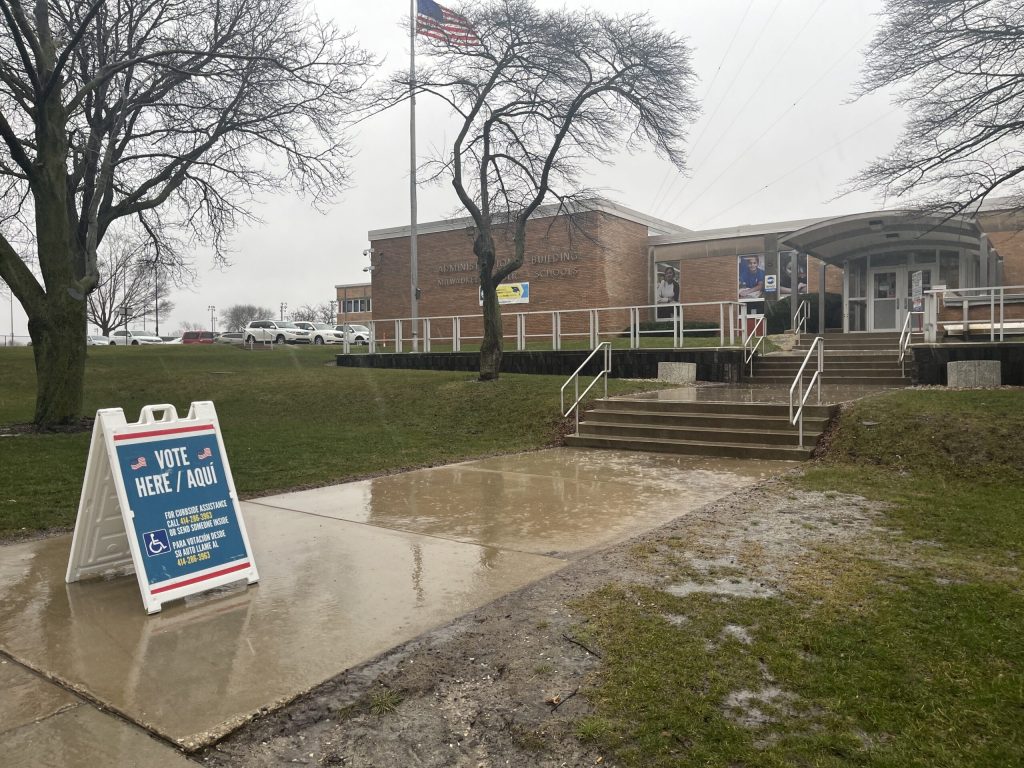Wisconsin Legislators Seek to Restrict School Referendums
As referendums hit record numbers Senate Committee considers new limitations.

Milwaukee Public Schools asked voters to approve a $252 referendum Tuesday. Without it, district officials say programs will have to be cut. Photo courtesy of Julia Turner
Wisconsin voters approved a record number of referendums in 2024 to increase property taxes to fund their local schools. Now legislators are looking for ways to address school districts’ growing dependence on referendums.
The Senate Committee on Education held two public hearings Tuesday that would increase transparency for referendums and eliminate recurring referendum requests.
Since February 2024, Wisconsin voters have been asked 210 times to approve operating referendums, which allow districts to raise their tax levy in order to fund day-to-day operations.
Of those, 131 have passed, Ari Brown, a senior researcher with the Wisconsin Policy Forum, told WPR in April.
When the referendums fail, districts typically go back and ask voters a similar question within two years, Brown said.
One of the new bill proposals would require school districts to provide a “good faith estimate” of the annual dollar amount difference in property taxes on a median-valued, single-family residence if a referendum is passed.
State Rep. Scott Allen, R-Waukesha, who introduced the bill, said the purpose isn’t to sway people, but to allow for more informed decisions.
Allen said he likes the use of referendum questions, saying it’s democracy in its purest form in action.
“Whether they pass or fail, it is the decision by local residents,” Allen said. “The point is simply to ensure that voters are given the information that they need so that their decision is informed.”
Members of the Southeastern Wisconsin Schools Alliance, Wisconsin Association of School Boards and Wisconsin Rural Schools Alliance spoke against the bill.
The groups said the bill could cause confusion for voters. And the “good faith” amount on the ballot could differ from when a district gets the money due to market volatility.
The committee also heard a bill that would eliminate referendum questions that allow permanent operational funding increases. It would also limit referendum requests that are longer than four-years.
Kenosha Unified School District Superintendent Jeffrey Weiss testified on both bills.
He said school districts don’t take the decision to go to referendum lightly.
In February, Kenosha failed a five-year, $23 million operational referendum. This came after the district already closed seven schools and cut $1 million from its budget.
“The community will hold us accountable for our referendums,” Weiss said.
“These bills about referendums are trying to treat a symptom,” he added. “I don’t want to lose my ability to go to the community. There are not another seven schools in the city of Kenosha that I can close.”
When referendums fail, school districts have to make difficult decisions including program cuts, layoffs or closings.
In April, voters approved about 55 percent of the 89 referendums across the state.
Shortly after voters rejected a referendum proposed by the Fond du Lac school district, officials announced they would eliminate 83 positions, to cover a $7.5 million budget shortfall next year.
Wisconsin school referendums would have new limitations, requirements under proposals was originally published by Wisconsin Public Radio.
If you think stories like this are important, become a member of Urban Milwaukee and help support real, independent journalism. Plus you get some cool added benefits.






















So why is it that school districts are becoming dependent upon referendums? Could it be because the state has failed to provide necessary funds for school districts to operate? Could it be that support of private schools for the wealthiest families takes money from state school districts? Could it be in their attempt to punish MPS, the legislature is hurting school districts throughout the state?
I think what were be far more effective is a calculation of the return on investment of money spent to educate ALL Wisconsin children, not just those who are able to access choice schools.
What he said! ^^